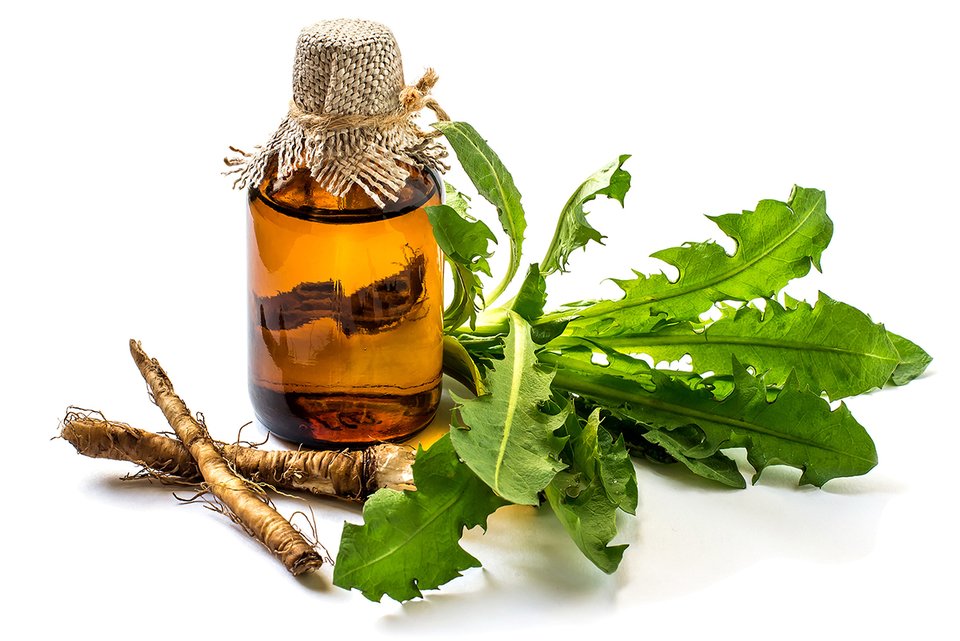But, if you put aside your prejudice, you may be surprised by the lowly dandelion's benefits. Dandelion root is often found in teas or consumed whole to stimulate appetite and modulate gallbladder function. The leaves, always a great addition to salad, act as a diuretic that helps your body get rid of excess fluid. And the dandelion flower is believed to be able to keep LDL (bad cholesterol) levels within normal range.
Whether you add the leaves to your salad, grind up the roots, or transform its flowers into wine, you'll do well by making this pervasive and, yes, invasive, plant a part of your new, improved diet.
A Pharmacy in Your Front Yard
Although traditional Chinese medicine has been using dandelions as herbal medicine for thousands of years, there are only a handful of scientific studies about its medicinal value—and the most of those have be done with animals, not people. But we do know that this plant is a rich source of vitamins A and C, as well as calcium, potassium, and magnesium.[1] We also know it can be used in a number of specific ways.Natural Diuretic
Bodybuilders and weight-class athletes looking to drop the last few pounds of water weight sometimes use dandelion juice to help them get ready for a show or competition. The dandelion plant acts as a diuretic, stimulating urination to quickly release excess water and sodium.[2,3]Yes, you get shredded. But you can also deplete your body of important minerals and electrolytes—and cause dehydration, which inhibits performance. That's why I don't recommend using dandelion to keep your overall water weight down. It's okay to use it prior to a competition, just make sure it doesn't become part of your long-term weight strategy.

Appetite Stimulant
Hardgainers, listen up! If you struggle to finish off your meals (I honestly have no idea what that feels like), consider putting a few dandelion leaves on your next salad or having a cup of dandelion tea with your meal. The leaves have been said to stimulate appetite, improve digestion, and reduce flatulence. Don't expect to gain weight from just eating a few leaves, but you may find yourself having an easier time digesting food.Gallbladder Health
Preliminary research shows dandelion may increase bile production. Dandelion leaf extract has been shown to increase bile secretion in rats by 40 percent.[4] More research is needed to see if this same benefit would extend to humans, but it's worth noting.Inflammation Relief
Dandelions' anti-inflammatory qualities may help relieve inflammation associated with exercise. Again, this research was done with animals.[5] But the plant does contain flavonoids, and flavonoids can reduce inflammation. So it may well be that dandelions reduce problems associated with excessive post-exercise inflammation.[6]Cholesterol Control
Early animal studies also suggest that, because of the antioxidant properties of the vitamin C it contains, dandelions may help control total cholesterol and triglycerides levels, while raising HDL (good) cholesterol levels.[6]Should You Be "Wary of the Weed"?
Assuming you're healthy and don't have any underlying medical conditions, you can safely use dandelion-based products every day. If you're allergic to ragweed, marigold, daisies, or iodine, avoid dandelion to prevent potential allergic reactions.If you're currently taking other medications, wait 2-3 hours before consuming anything with dandelion in it, since the plant's diuretic effect could cause certain medications to leave your body too quickly.
Dandelion-based products are available as powders, capsules, liquid extracts, and teas. Find the product that meets your needs. Just be sure to check the ingredients, as you would with anything you put in your body.
References
- Escudero, N. L., De Arellano, M. L., Fernández, S., Albarracín, G., & Mucciarelli, S. (2003). Taraxacum officinale as a food source. Plant Foods for Human Nutrition, 58(3), 1-10.
- Clare, B. A., Conroy, R. S., & Spelman, K. (2009). The diuretic effect in human subjects of an extract of Taraxacum officinale folium over a single day. The Journal of Alternative and Complementary Medicine, 15(8), 929-934.
- Hook, I., McGee, A., & Henman, M. (1993). Evaluation of dandelion for diuretic activity and variation in potassium content. International Journal of Pharmacognosy, 31(1), 29-34.
- Chabrot, E., & Charonnat, R. (1935). Therpeutic agents in bile secretion. Annals of Medicine, 9, 1463-67.
- Jeon, H. J., Kang, H. J., Jung, H. J., Kang, Y. S., Lim, C. J., Kim, Y. M., & Park, E. H. (2008). Anti-inflammatory activity of Taraxacum officinale. Journal of Ethnopharmacology, 115(1), 82-88.
- Choi, U. K., Lee, O. H., Yim, J. H., Cho, C. W., Rhee, Y. K., Lim, S. I., & Kim, Y. C. (2010). Hypolipidemic and antioxidant effects of dandelion (Taraxacum officinale) root and leaf on cholesterol-fed rabbits. International Journal of Molecular Sciences, 11(1), 67-78.
Leave your comment below.
Click Here For More Articles

No comments:
Post a Comment